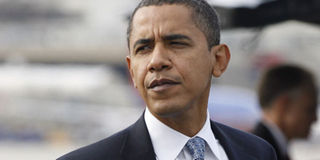Obama headache is on foreign policy

US President Barack Obama. Photo/FILE
WASHINGTON, Monday
President Barack Obama is fond of saying he has a lot on his plate as he wrestles with the worst economic crisis in decades, but arguably it is his ambitious foreign policy agenda that marks him as a glutton.
President Obama has ordered the closure of the US prison for terrorism suspects at Guantanamo Bay, appointed special envoys for Sudan, Afghanistan-Pakistan and the Middle East, engaged old foes Iran and Cuba, sought to thaw frosty ties with Russia and tried to mend fences with European allies alienated by his predecessor George W. Bush’s “go-it-alone” style.
Analysts agree President Obama’s efforts to make a sharp break with Bush were arguably the easy part. He has laid the foundation for a new less aggressive foreign policy, but delivering concrete results will be harder.
Here are a few of the foreign policy challenges he has tackled and the problems he still faces:
In Iraq; President Obama has ordered an end to combat operations in Iraq by the end of August 2010 and the eventual withdrawal of all US troops by the end of 2011. Violence has dropped dramatically in Iraq over the past year, but a spike in suicide bombings underscore the unpredictability of Iraq and could still jeopardise that timetable.
In Iran; in a sharp break from the Bush administration’s policy of isolating Iran, President Obama has explored the possibility of direct talks without preconditions, offering the hope of renewed ties if it “unclenches its fist”. But, while Obama has changed Washington’s tone toward Iran, his policy goal is no different from Bush’s -- to stop it from building a nuclear bomb.
And like the Bush administration, he also favours a carrot and stick approach, offering economic incentives but also the threat of more sanctions if Iran continues its nuclear work.
The rhetoric emanating from Iran has not noticeably softened in response to Obama’s outreach. In fact Tehran has jailed a US-Iranian journalist on spy charges Washington says are false and pushed ahead with its uranium enrichment work.
In the end, the first tentative diplomatic forays are likely to take place out of public sight to give both sides more room to manoeuvre.
In Russia; President Obama’s vice Joe Biden, coined a new catch-phrase when he said the new administration wanted to “press the reset button” on US-Russian ties that soured under Bush and then-Russian President Vladimir Putin.
President Obama and President Putin’s successor, Dmitry Medvedev, appeared to hit it off at the G-20 summit in London and committed themselves to reducing their countries’ nuclear arsenals. With the arms control pact due to expire in December, a senior White House official to work on a new treaty would be a foreign policy priority in the next few months.
In Palestinian-Israeli conflict; if President Obama is serious about reaching out to the Muslim world, then movement on resolving the conflict is critical. He has reiterated his desire for a two-state solution and dispatched his secretary of state Hillary Clinton and new envoy George Mitchell to the region but has yet to come up with a new strategy to push the stalled peace process forward.
The senior White House official said President Obama would become more deeply involved in the peace process in coming months.
In Afghanistan-Pakistan, now dubbed “Obama’s war” after he put his stamp on the seven-year-old conflict by unveiling a new strategy aimed at crushing Al Qaeda and ordering 21,000 more troops to Afghanistan.
The US also plans to send billions of dollars in aid to neighbouring Pakistan to shore up the weak government and combat the growing threat of the Taliban there.
In North Korea; President Obama has found it tough going with the communist state, where diplomacy is often a case of one step forward and three steps back. Pyongyang has responded to his offer of normal ties by launching a long-range rocket, pulling out of six-party nuclear talks and kicking out UN nuclear inspectors.
In Cuba, President Obama has shown a willingness to set aside rigid ideological differences of the past. (Reuters)


